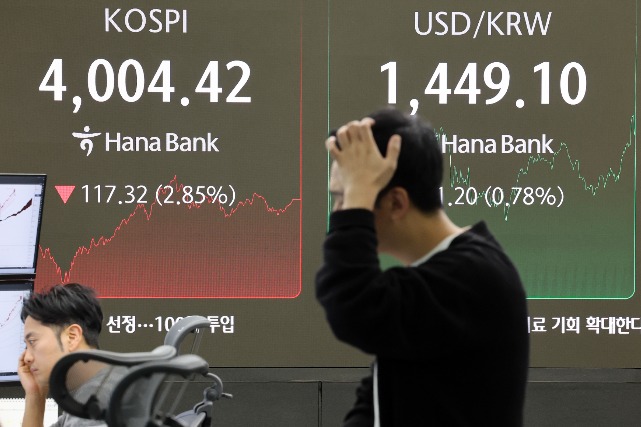UPDATE: South Korea’s Kospi index has just plunged 2.9%, closing at 4,004.42 on November 5, 2025, marking its steepest drop in three months. This sudden downturn raises urgent concerns over an artificial intelligence bubble and follows a wave of profit-taking after an impressive rally.
The Kospi soared nearly 20% last month, making it the world’s top-performing major stock index. However, it fell sharply today, reaching an intraday low of 6.2% and triggering a sell-side circuit breaker to halt futures trading for five minutes. This marks the largest single-day decline since August 1, when the market reacted negatively to the Korean government’s tax reform plans.
In tandem, the Kosdaq index dropped 2.7% to 901.89, with both indices experiencing sidecar halts—the first occurrence since August 5, 2024. Foreign investors reacted by unloading about 2.5 trillion won (approximately $1.7 billion) in Korean shares, intensifying market volatility.
Market anxiety was heightened by weak performances from U.S. tech stocks, particularly in the chip and AI sectors, with companies like Palantir and AMD reporting declines despite strong earnings. The ripple effects were felt across Asia, with Japan’s Nikkei 225 and Taiwan’s Taiex also dropping over 1%.
“Profit-taking after such significant gains was inevitable,” stated Lee Han-young, head of equity investment at Vogo Fund Asset Management. He described the decline as “a natural correction within an extended bull run.”
The Korean won has also weakened, closing at 1,449.40 per U.S. dollar, breaching the 1,450 mark for the first time in seven months. This depreciation is attributed to heavy foreign outflows and a stronger dollar.
In a surprising twist, retail investors stepped in to buy the dip, purchasing a net of 2.6 trillion won in Kospi stocks. Their focus was primarily on major players like SK Hynix Inc. and Samsung Electronics Co. Retail investments surged, with approximately 7 trillion won funneled into domestic stocks over the past three sessions, reversing months of caution.
However, short-selling activities have surged as investors bet on further declines. As of October, short interest on the Kospi reached 12.46 trillion won, a 9% increase in just one month. Securities on loan, indicating future short trades, jumped by 17% to 123.7 trillion won, reflecting a strategy to hedge against potential market downturns.
Despite the turbulence, analysts are framing this correction as healthy rather than indicative of a structural downturn. “Today’s drop stemmed largely from profit-taking and the underperformance of U.S. tech stocks, coupled with warnings of a potential 10-15% correction,” explained Lim Jeong-eun, an analyst at KB Securities Co. “However, the Kospi remains clearly in a bull-market zone.”
Looking ahead, investors are advised to monitor liquidity conditions and earnings prospects for chipmakers. With active retail accounts surpassing 95 million and the margin loan balance nearing a record 25 trillion won, the market may quickly rebound.
As developments unfold, the key takeaway is that this market correction, while significant, is not expected to lead to a lasting downturn. The resilience of individual investors and strong fundamentals in the tech sector suggest that the Kospi could recover from this dip sooner rather than later.







